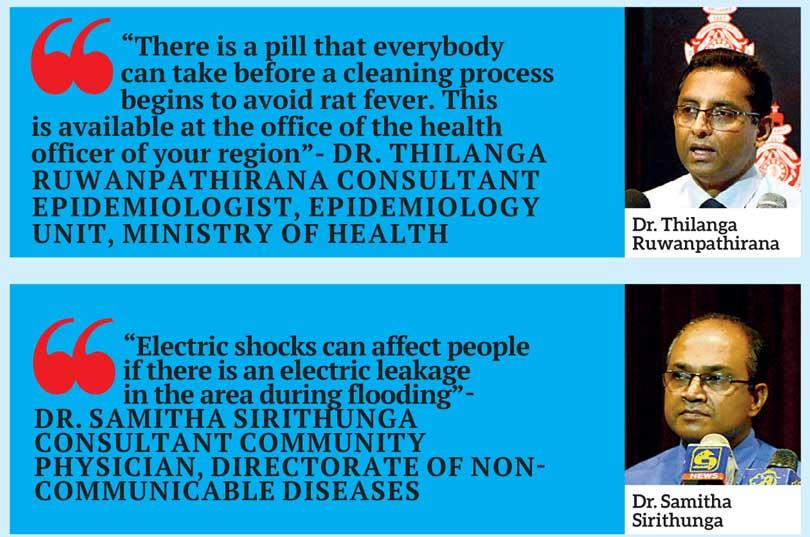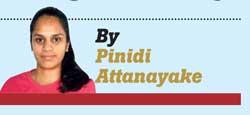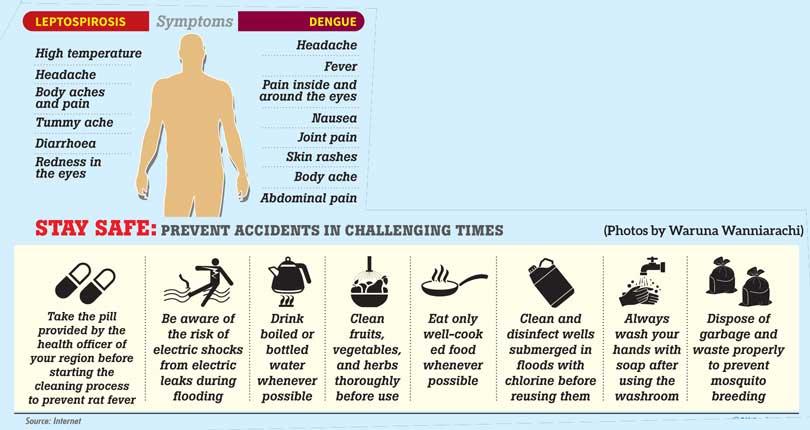21 Jun 2024 - {{hitsCtrl.values.hits}}

 Continuing rains and certain areas being submerged have left many dead and scores of people missing. In this backdrop the Daily Mirror spoken to medical experts to obtain their views on how to combat diseases and prevent accidents during such challenging times.
Continuing rains and certain areas being submerged have left many dead and scores of people missing. In this backdrop the Daily Mirror spoken to medical experts to obtain their views on how to combat diseases and prevent accidents during such challenging times.
“Dengue and rat fever disease can spread when floods are controlled and decreasing. Without sticking to a certain place, one should clean all the areas affected by the flood,” said Consultant Epidemiologist, Epidemiology Unit, Ministry of Health, Dr. Thilanga Ruwanpathirana.
He added that symptoms of rat fever and dengue are the body becoming unfit and certain parts of the body being weak. He added that such a person should directly contact a doctor and take necessary steps to get cured. “There is a pill that everybody can take before a cleaning process begins to avoid rat fever. This is available at the office of the health officer of your region,” said Dr. Ruwanpathirana. Moreover, he said that skin rashes can occur when an individual is exposed to flood water for a long time.
Consultant Community Physician, Directorate of Non-communicable Diseases, Dr. Samitha Sirithunga said “electric shocks can affect people if there is an electric leakage in the area during flooding”. Though people are driving through floods- due to various important matters- such activities can cause damage to the engine; such as mixing water with the engine oil and the brakes can also be affected.
During floods
There are floods in some parts of the island due to recent heavy rains. There is a risk of water-borne diseases spreading. Such diseases are dysentery, diarrhea and rat fever. As the water level rises, there is a risk of drinking water sources being contaminated. One such source is the wells and this happens due to overflowing of toilet pits in these areas and garbage washing on to the ground. Therefore, rat fever and other infections can spread through mud and the germs that cause this disease get deposited once the water level decreases”, said Dr. Ruwanpathirana.
Using water during/after a flood
The public is requested to drink boiled water or bottled water whenever possible. Even mountain water can be used for drinking, preparing and cleaning food and cooking during these challenging times.
Food Safety
Fruits, vegetables and herbs should be cleaned very well before use and if possible, avoid eating raw vegetables and herbs during these disease spreading days. If necessary, dip raw food in Salt-mixed water and wash it well before consuming. Be sure to eat only well-cooked food as much as possible
Food taken from outside and prepared by oneself should be consumed immediately and don’t forget to check for basic signs of spoilage before consumption. After preparing the food, keep it tightly covered.
Well and toilet safety
Wells submerged in river water should be sprayed clean and disinfected with chlorine before re-use. Necessary instructions and chlorine can be obtained from the Public Health Inspector or the Office of the Medical Officer of Health (MOH).
Always wash your hands with soap after using the washroom.
Disease prevention
There is a risk of increased mosquito-borne diseases such as dengue and barava (Elephantiasis) due to the pooling of water during the receding flood season. Therefore, be careful to remove such water from the environment. Dispose of garbage and other waste properly whenever possible. Necessary advice and support can be obtained from the MOH or Public Health Inspector (PHI)

23 Nov 2024 23 Nov 2024
23 Nov 2024 23 Nov 2024
23 Nov 2024 23 Nov 2024
23 Nov 2024 23 Nov 2024
23 Nov 2024 23 Nov 2024